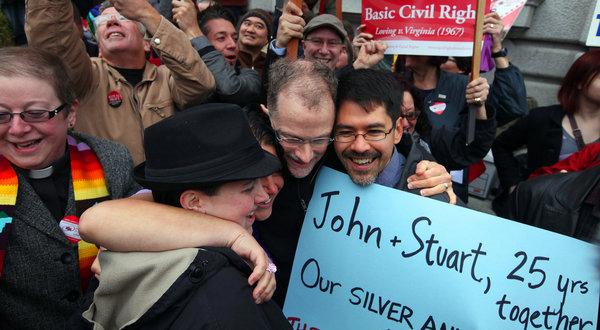Students react to Proposition 8 and same-sex marriage

Thousands gather in Chicago to protest Proposition 8.
February 21, 2012
On Feb. 7 the United States Court of Appeals for the Ninth Circuit declared California’s ban on same-sex marriage to be unconstitutional. This ruling helped fuel the fight for marriage equality that is currently sweeping many states across the U.S.
Though the civil rights era of the 1960’s remains decades in the past, the egalitarian spirit of this movement is still strong today. While some have made great strides, others have lagged behind in the search for equal citizenship. In a country that claims to champion equality, some citizens continue to lack basic civil rights as they face both social and legal discrimination.
Ironically, the 2008 amendment known as Proposition 8 was passed by a narrow margin in California on the same day that America had elected its first African-American president. Many gay and lesbian citizens that had previously enjoyed the right to marry in the state had their rights stripped away as legal discrimination reared its ugly head.
The Feb. 7 ruling against the ban stated that it was in violation of California’s Equal Protection Clause by singling out a minority group and denying marriage rights that they had previously been granted. This decision upheld a 2010 ruling by Judge Vaughn Walker.
In the ruling, Judge Stephen Reinhardt denounced the discriminatory nature of the amendment: “Proposition 8 serves no purpose, and has no effect other than to lessen the status and human dignity of gays and lesbians in California and to officially reclassify their relationships and families as inferior to those of opposite-sex couples.”
The dismissal of Proposition 8 certainly stands out in recent news as an important effort in the process of obtaining equality and social justice in the U.S., however, it is only one small step towards progress.
Marriage remains a reserved power in America designated to the state, and in 1996 the Defense of Marriage Act was passed, which prohibits federal recognition of same-sex marriages, restricting the union’s legitimacy to the state in which it’s performed.
The California-centric nature of the case resulted in a fairly narrow ruling that was not as broad as Judge Walker’s original ruling. As reported in a New York Times editorial, the court’s decision “stopped short of finding a broad constitutional right to marry that would have extended same-sex marriage to every state.” Supporters of the ban will probably try to appeal, though it seems unlikely for the state-specific case to be taken on by the Supreme Court.
However, the ban has yet to be lifted and same-sex marriages will not be permitted to resume immediately in California, as a temporary block has been issued by the court. This topic continues to incite controversy in the news as the ruling has established itself as a small victory for social justice and equality and the bane of Proposition 8 supporters’ conservative efforts.
As the story of this recent ruling circulates and the efforts to create a more equal America continue to soak up the media spotlight, the public offers their opinion.
Assistant Professor of Sociology Dr. Marcus Aldredge offers the following statistic: “Survey research shows dramatic changes in public opinion over just the last 10 years. Recent surveys show the country’s public opinion is close to evenly split, drastically different from 10 years ago when just shy of 60 percent and roughly 15 years ago 75 percent of the American public was against marital rights for gays and lesbians.”
America has shown a significant shift in opinions on such controversial societal issues. The young, female, urban and educated populations seem to be the most accepting demographic for the cause. As recent cultural trends continue, odds are that the nation will become more tolerant of such diversity.
In light of this recent event, what does the Iona community have to say? Many interviewed students share the belief in non-discriminatory equality that concurs with the ruling against Proposition 8.
Junior Jamieson Kennedy said, “I believe marriage should be between two people who care about each other deeply. If they are the same sex, then so be it.”
In addition to the concern for equality, some students are perturbed by the legal aspect of the case and the ban’s relationship with American ideals.
Senior Mike Petre said, “The ban was evident of an ‘excessive entanglement’ between Church and State, in the first place. The California Circuit Court overturning the ban is consistent with our nation’s fundamental beliefs of freedom of life, liberty and the pursuit of happiness. Any individual should be afforded the right to marry whomever they choose, especially in a nation that preaches acceptance and equality.”
Other students, however, upheld the idea of the reserved power of the state to decide upon marriage laws.
Senior James Hurley said, “Marriage is a reserved power. Therefore, for the time being, I think the proper place for such a discourse is indeed in state legislatures and, if need be, the court systems.”
Currently, six states as well as the District of Columbia grant marriage licenses to same-sex couples. Two additional states, New Jersey and Maryland, are currently deliberating over the issue. However, victory must be savored one step at a time. So long as marriage remains a reserved power, change will continue to occur on an individual state basis.
“Much like with previous civil rights movements, it’s an incremental process toward obtaining civil rights for all, unless federal civil rights bills are passed in congress much like that in 1965 regarding racial and ethnic civil rights,” said Aldredge.
So with the Prop 8 overturn, America’s most recent civil rights movement continues its slow crawl towards justice.







